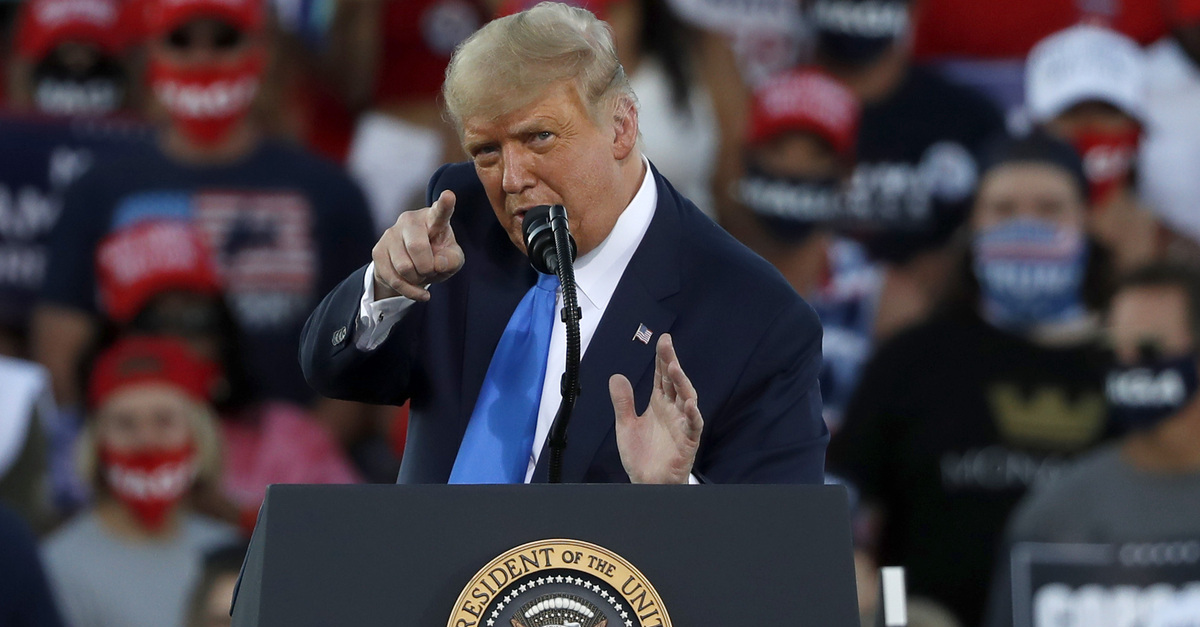
President Donald Trump gestures during a campaign rally on October 18, 2020 in Carson City, Nevada.
Donald Trump and the Republican party do not have to face allegations that they violated the Voting Rights Act in the 2020 presidential election, a federal judge ruled on Friday.
The judge withheld ruling on whether Trump and the GOP must face claims that they violated the Ku Klux Klan Act, which for now survives intact. Trump and the RNC lost a separate motion to transfer the remaining litigation away from the Democratic stronghold jurisdiction of Washington, D.C.
Senior U.S. District Judge Emmet Sullivan scoffed at Trump’s notion that a federal court in Washington, D.C. lacks jurisdiction to preside over the former president’s claims.
“This Court is presented with an argument that is perhaps as unprecedented as it is outlandish: the former President of this country denying that he lived in and had minimum contacts with the country’s capital and the White House during his time as President,” Judge Sullivan wrote.
Originally filed by the Detroit-based Michigan Welfare Rights Organization in November 2020, the lawsuit initially targeted Trump and his campaign for a single alleged violation of the Voting Rights Act. A month later, an amended complaint added the Republican National Committee as a defendant and an eye-opening top count: alleged violation of the Ku Klux Klan Act. More plaintiffs also signed onto the legal action, including the NAACP and three Black voters from the Detroit: Maureen Taylor, Nicole L. Hill and Teasha K. Jones.
The lawsuit noted that Trump and the Republican party directed their election-subversion efforts in places with large numbers of people of color.
“Under the specter of preventing ‘fraud,’ defendants engaged in a conspiracy, executed through a coordinated effort, to disenfranchise voters by disrupting vote counting efforts, lodging groundless challenges during recounts, and attempting to block certification of election results through intimidation and coercion of election officials and volunteers,” the amended complaint states. “These systematic efforts – violations of the VRA and the Ku Klux Klan Act – have largely been directed at major metropolitan areas with large Black voter populations. These include Detroit, Milwaukee, Atlanta, Philadelphia, and others. Defendants have not directed these efforts at predominantly white areas.”
Sullivan ruled that the civil rights groups lack standing to advance the Voting Rights Act claim because the lawsuit focuses on past conduct, yet seeks relief on future conduct.
“Plaintiffs seeking injunctive or declaratory relief must ‘establish standing by demonstrating that, if unchecked by the litigation, the defendant’s allegedly wrongful behavior will likely occur or continue, and that the ‘threatened injury is certainly impending,’” the opinion states. “In other words, ‘past wrongs’ do not ‘themselves amount’ to the kind of “real and immediate threat” of future injury ‘necessary to make out a case or controversy’ for a claim seeking only equitable relief.”
Trump and the Republican party failed, however, to transfer the venue, a gambit that the civil rights groups described as forum shopping.
“Defendants present no argument for why Michigan is a more convenient or cost-effective forum for ‘State Election Officials,’ the ‘RNC State and Regional Staff,’ the ‘Trump Campaign State Staff,’ and the ‘RNC and Trump Campaign State Volunteers’ who are located not just in Michigan but ‘throughout the country in various other states,'” he wrote.
Sullivan declined to reach the Ku Klux Klan Act allegations at this time, but another lawsuit against Trump deploying this statute passed a different federal judge’s muster.
In February, U.S. District Judge Amit Mehta advanced parts of three lawsuits against Trump, including allegations under the KKK Act, a Reconstruction-era law originally designed to punish conspiracies to interfere with the civil rights of formerly enslaved people by white supremacist and vigilante groups.
Lawyers for Trump, the RNC, and the Michigan Welfare Rights Organization did not respond to Law&Crime’s press inquiries.
Update—April 1, 2022 at 5:10 p.m. Eastern Time: This story has been updated to include the judge’s full opinion, which was released following a shorter order.
Read the judge’s opinion below:
(image via Stephen Lam/Getty Images)